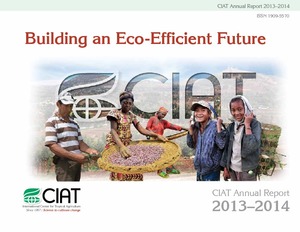Mission
To reduce hunger and poverty, and improve human nutrition in the tropics through research aimed at increasing the eco-efficiency of agriculture.
People
CIAT’s staff includes about 200 scientists. Supported by a wide array of donors, the Center collaborates with hundreds of partners to conduct high-quality research and translate the results into development impact. A Board of Trustees provides oversight of CIAT’s research and financial management.
Values
- Shared organizational ethic
- We respect each other, our partners, and the people who benefit from our work. We act with honesty, integrity, transparency, and environmental responsibility in all of our joint endeavors.
- Learning through partnerships
- We work efficiently and pragmatically together and with partners. Considering our diversity to be a key asset, we adapt readily to change and strive to improve our performance through continuous learning.
- Innovation for impact
- We develop innovative solutions to important challenges in tropical agriculture, resulting in major benefits for the people who support, participate in, and profit from our work.
Members:
Resources
Displaying 271 - 275 of 958Low emission development strategies for agriculture and other land uses: The case of Colombia
The purpose of the work presented in this report is to demonstrate that policymakers have tools at their disposal that provide significant help in the evaluation of trade-offs, opportunities, and repercussions of the policies under consideration. This report focuses on Colombia, however the analytical framework can be applied to any country interested in exploring country-wide effects and economic viability of policies that aim to reduce GHG emissions from agriculture. Results provided in this study should be seen as an example of the potential applications of the framework developed.
Contextualizing family agriculture in Nicaragua: preliminary results on a cross-CRP collaboration
Climate-Smart Agriculture in El Salvador
The climate-smart agriculture (CSA) concept reflects an ambition to improve the integration of agriculture development and climate responsiveness. It aims to achieve food security and broader development goals under a changing climate and increasing food demand.
Climate-Smart Agriculture in Sinaloa, Mexico
The climate-smart agriculture (CSA) concept reflects an ambition to improve the integration of agriculture development and climate responsiveness. It aims to achieve food security and broader development goals under a changing climate and increasing food demand.





